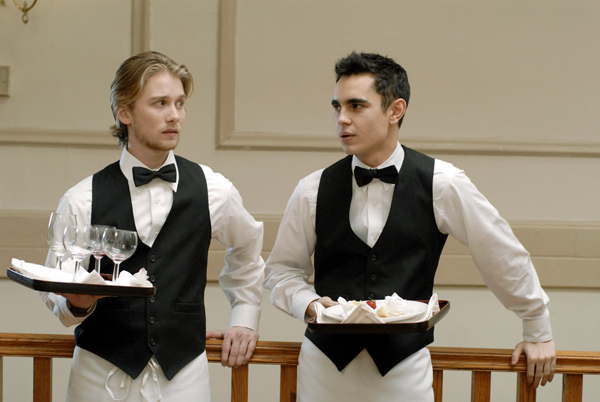|
Reviews of Recent Independent, Foreign, & Documentary Films in Theaters and DVD/Home Video

BRIEF INTERVIEWS WITH HIDEOUS MEN The late David Foster Wallace is a polarizing contemporary author. His writing style is consistently obtuse and wordy—the kind with multiple self-referential appendices. In some ways, his books seem impossible to mold into other mediums, like turning a Wallace Stevens poem into a play. So it’s incredibly ambitious for first-time writer-director John Krasinski—best known as John Halpert, the lovable goofball in The Office—to adapt something like Brief Interviews with Hideous Men, a far-ranging collection of imperfect but interesting monologues. It seems like a dumb choice to make into a movie, but makes sense when evaluated against some of Wallace’s other books, like Infinite Jest, his thundering thousand-page beast. Krasinski attempts to literally translate his source material onto film, which is difficult. Some monologues lend themselves to dramatic rendering more than others, and he choose only these. (Others were written in shorthand or from the perspective of a computer terminal.) But then he gets creative. Because the book is a bunch of monologues referred to as interviews in Wallace’s title, he frames these as genuine interviews. Since the speakers are all neurotic, the interviewer is a psychologist in grad school researching a thesis. All the monologues are delivered by men, and you can’t make a movie without women, so the grad student is a woman who decided to pursue her project to get over a breakup. It’s a framing device that feels desperate. Sara (Julianne Nicholson, who looks bored) interviews the men, who recount their horrific and hilarious interactions with women, their families, and the world. When the interviews start, she becomes completely silent as Krasinski flicks through Wallace’s material. What keeps the movie interesting is the dialogue, lifted almost entirely from the book. Wallace’s character sketches are fantastic, if uneven, and Krasinski has lined up a laudable crew of male characters actors: Max Minghella, Dominic Cooper, Christopher Meloni, and Will Forte, just to name a few. What isn’t lifted from the book—the discordant scenes involving Sara that connect each interview, not that she talks all that much—pale alongside the style and intelligence of Wallace’s stories. No matter what you think of his writing versus Krasinski’s screenwriting, there’s a palpable discrepancy whenever the film shifts between the two. Worse, when
Krasinski does get creative with Sara’s story, her professor (Timothy
Hutton) and ex-boyfriend (Krasinski) are used as excuses to lift even
more monologues from the book. Poor Julianne Nicholson becomes silent
again, and listens. The movie ends with a flashback, where Sara tells
her professor that the only way to examine feminism is to interview men,
and she then comes up with her idea for a groundbreaking research
project. Krasinski may be talented outside of his television career, but
this should’ve been his third or fourth film, not his first.
Zachary Jones
|

